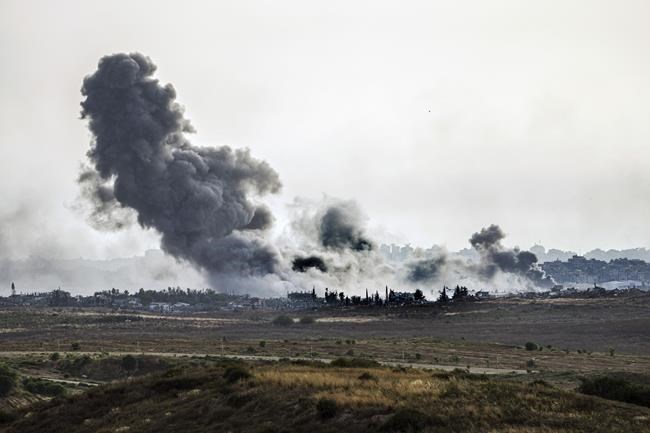ST. JOHN'S, N.L. — Lawyers are questioning Canada’s approach to screening visa applications for people in Gaza with extended family in Canada after one applicant, a medical worker, was asked whether he had treated members of Hamas.
The Canadian Press obtained a redacted letter sent to the applicant by a Canadian immigration officer, which asks if he has "ever provided medical care to injured Hamas members." If he has not, the letter asks him to say how he was able to refuse "without consequences.”
Kelly O'Connor, an immigration lawyer in Toronto, said she gasped out loud when she saw the text. Any medical worker who denies care to someone hurt in a war zone is committing a "serious breach of the Geneva Convention," she said in an interview.
"It's completely outrageous that the government would ask these kinds of questions because it's trying to promote that someone would violate the Geneva Conventions in wartime, which is really not something that the Canadian military stands for," O'Connor said.
Visa applicants are already СŔ¶ĘÓƵ asked "very invasive questions" in the process, she added. "And then seeing this letter? It's just really shocking."
The Canadian visa program has been mired in setbacks and controversy since it opened on Jan. 9. It is open to Canadian citizens and permanent residents hoping to get extended family members out of the Gaza Strip, where the war between Israel and Hamas has killed more than 35,000 Palestinians, according to Gaza health officials.
The war began after Hamas-led militants killed around 1,200 people in Israel, mainly civilians, and abducted around 250 others on Oct. 7, 2023.
Applicants to Canada's special temporary visa program must complete several steps. First, a relative in Canada must submit a "statutory declaration" indicating the family members in Gaza for whom they are seeking visas, as well as voluminous details about each member, including a description of scars and markings on their bodies, and a list of all the jobs they have held since they were 16 years old.
The questions go "above and beyond what is asked in a normal immigration application," O'Connor said.
The declarations are examined by Immigration, Refugees and Citizenship Canada, which then sends a unique code to each family member listed in the document. Those family members use their code to file a second batch of paperwork for a temporary visa. They must then somehow get from Gaza to the Canadian immigration office in Cairo, Egypt, to complete a final screening process.
More than 7,500 people submitted statutory declarations between Jan. 9 and April 1, according to data obtained through an access to information request. As of April 29, 179 people had been granted temporary visas.
Canada has been unable to work with Egypt or Israel to get applicants across the border. Those who have been granted visas have made it across themselves, often by paying thousands of dollars to a private company.
O'Connor represents three Canadians who filed declarations for a total of 16 family members in Gaza, though one -- a child -- has since died. She said they are all still waiting for the codes needed to proceed to the second phase of the process.
The letter sent to the medical worker, whose name was blacked out because he feared repercussions, is on the letterhead of the Canadian embassy in Amman, Jordan, and its contents are attributed to an unnamed migration officer with Immigration, Refugees and Citizenship Canada. Before inquiring about care provided to Hamas fighters, it asks for the applicant's work history at two Gaza hospitals.
Vancouver-based immigration lawyer Randall Cohn said the questions in the letter are "patently illegal and absolutely egregious." He has seen two such letters asking about medical treatment of Hamas members -- sent to a doctor and a nurse -- and he is aware of two more, he said in an interview.
The people who received these letters and brought them to lawyers were afraid to do it, Cohn said, because they worried they would be penalized by Canadian immigration officials. He wonders how many other people have received similar letters but haven't shown them to anyone out of fear.
Cohn said he hopes the questions were a mistake made by an "overzealous" visa officer, and that the letters have since been corrected. Either way, he added, "Canadians should know that the immigration system works in such a centralized and messy way that it allows for this kind of discriminatory treatment, and it usually goes uncorrected and unpunished."
The federal Immigration Department said that an interview with its minister, Marc Miller, was not possible. In an emailed statement, spokesperson Jeffrey MacDonald said visa applicants may be asked additional questions about their employment and travel history, and their online presence, as part of Canada’s screening process.
MacDonald declined to comment on why it asked a medical worker about whom they had treated, citing privacy reasons.
Canada lists Hamas as a terrorist group, and Canada has the right to screen visa applicants for possible security threats, said Lorne Waldman, a Toronto-based lawyer who wrote a widely used textbook on Canadian immigration law.Â
"But this type of question is completely unacceptable," Waldman said in an interview. "If there was a shootout in Toronto between members of a gang, a doctor wouldn't stop to ask whether a person was a gang member before they treated them."
Canada also cannot ask such questions of a visa applicant strictly for intelligence-gathering purposes, he said.
Richard Kurland of Lawyers for Secure Immigration, a group urging the government to ask pointed questions related to Hamas and terrorist activities, said he rejects the question on two grounds. One, because it only targets Hamas and not other terrorist groups operating in Gaza, and two, because it's "problematic," he wrote in an email.
"Even murderous terrorists deserve medical treatment," he said.
This report by The Canadian Press was first published May 19, 2024.
-- With files from The Associated Press
Sarah Smellie, The Canadian Press




